








Thompson leaves in protest as party set to ratify
By LEANDRA ROLLE Tribune Chief Reporter lrolle@tribunemedia.net
THE Free National Movement’s branch chairman for Central and South Abaco has resigned in protest as party officials prepare to ratify Abaco Chief Councillor Jeremy Sweeting as the candidate for that constituency.
Roscoe Thompson, the outgoing chairman, who had sought the nomination, confirmed to The Tribune yesterday that he officially stepped down earlier this week, saying he could not support Mr Sweeting. He declined to elaborate further. Both men are high-profile
By LYNAIRE MUNNINGS
Tribune Staff Reporter lmunnings@tribunemedia.net
THE Office of the Director of Public Prosecutions (ODPP) successfully concluded 47 percent of its criminal matters between July 2024 and June 2025 through either convictions or plea agreements, according to Attorney General Ryan Pinder’s 2025/2026 Budget contribution. Of the 163 matters disposed of during the period, 12 resulted in convictions, and 66 were resolved through plea deals. Another 30 cases ended in acquittals, and 55 were withdrawn due to either insufficient evidence or complainant


Work on new Supreme Court complex to begin by year’s end
By LYNAIRE MUNNINGS Tribune Staff Reporter lmunnings@tribunemedia.net
THE government plans to break ground on the new Supreme Court Judicial Complex before the end
of the year, with a public unveiling scheduled for July during the Bahamas’ Independence celebrations.
Making his 2025/2026 budget contribution, Attorney General Ryan Pinder said the new facility on
Shirley Street will improve public access to justice and boost confidence in the country’s judicial system.
“This state-of-the-art Supreme Court complex
By JADE RUSSELL Tribune Staff Reporter jrussell@tribunemedia.net
By LEANDRA ROLLE Tribune Chief Reporter
lrolle@tribunemedia.net
ATTORNEY General Ryan Pinder said yesterday that staffing for the Independent Commission of Investigations and the Office of the Ombudsman will come from an $11m global fund provision in the 2025/2026 budget despite their small individual lineitem allocations.
The government has allocated only $30,000 to the newly established Independent Commission of Investigations, a body the Davis administration promoted as key to
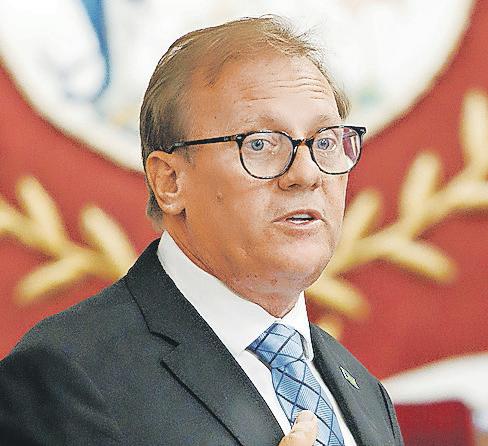
DEPUTY Prime Minister Chester Cooper said yesterday that the Boundaries Commission will formally begin its work on July 2, following delays and growing calls for constituency rebalancing ahead of the next general election.
Mr Cooper said the group has already held preliminary meetings but will engage more fully starting next week.
“We continue to do the




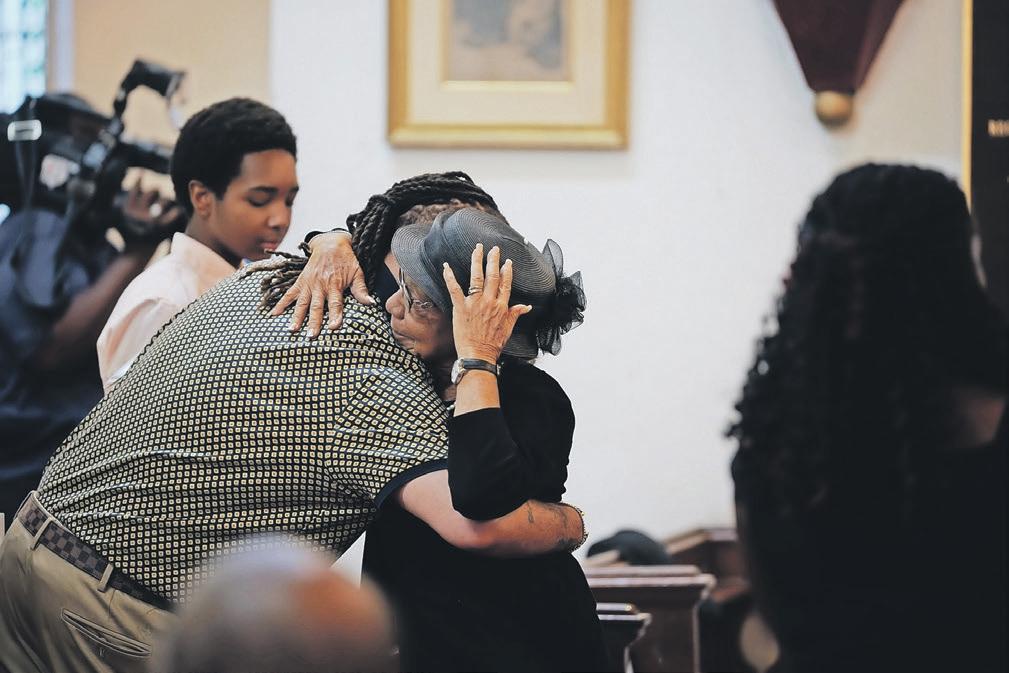
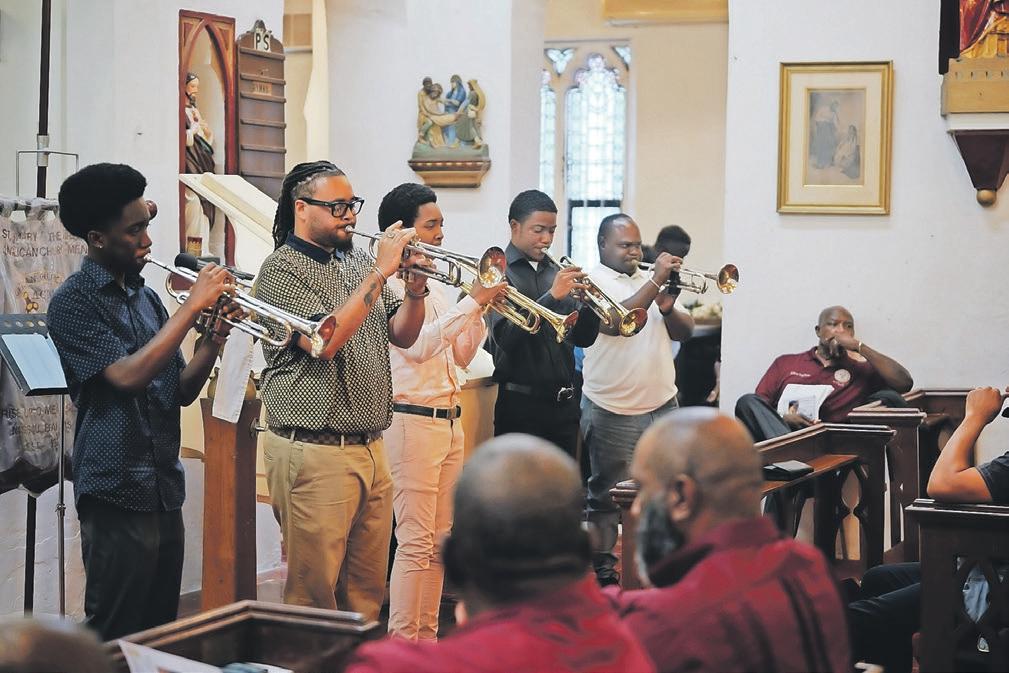
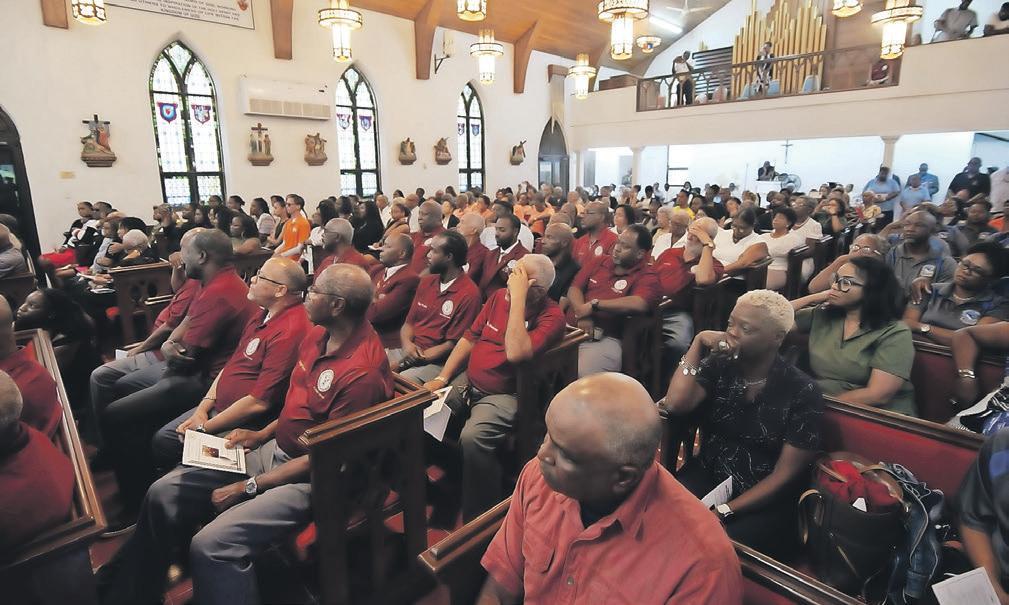

figures in Abaco: Mr Sweeting, a two-decade veteran of the Great Abaco Cays District Council, and Mr Thompson, the chairman of the Marsh Harbour/Spring City Township.
Vandea Stuart, the FNM’s former candidate for the area, is expected to serve as acting chairwoman of the branch until the next election.
The developments follow behind-the-scenes jostling, which also involved former Cabinet minister and North Abaco MP Darren Henfield, who had shown interest in the Central and South Abaco nomination. Mr Sweeting previously said he would step aside if Mr Henfield entered the race, while Mr Thompson pledged to contest it until the end.
The Tribune understands that Mr Henfield is being eyed for a seat in
New Providence and will not compete in Abaco. Party insiders expect his ratification soon. Meanwhile, in North Abaco, First Assistant Secretary at Local Government Terrece Bootle-Laing has been tapped to carry the FNM’s banner. She reportedly edged out contenders Ryan Forbes and another government official after receiving backing from senior party figures. Still, the selection has stirred discontent. Mr Forbes, a former pastor and community consultant, is said to enjoy significant grassroots support in areas like Dundas Town and Murphy Town, where his community involvement and island residency have earned him visibility. Social media has lit up with residents questioning the decision, highlighting Mr Forbes’ sustained presence in the constituency. The FNM is expected



The next general election is not due until October 2026, and top PLP officials have dismissed speculation about an early election. from
to ratify its first slate of candidates today at party headquarters in New Providence, with both Mr Sweeting and Ms
Bootle-Laing set to be officially confirmed. The developments come as election momentum builds: the Progressive
Liberal Party launched its first campaign rally this week, and the FNM is making strategic shifts in its candidate selection.
By JADE RUSSELL
Tribune Staff Reporter
jrussell@tribunemdia.net
ONCE on the brink of closure, the Dundas Centre for the Performing Arts is now undergoing critical repairs to restore its two theatres that have showcased Bahamian talent for generations.
Dorian Mckenzie, theatre assistant at the Dundas, said repairs began in March on both the Winston V Saunders Theatre, the main 332-seat auditorium currently closed, and the Philip A Burrows Black Box Theatre, an 80-seat space at the rear of the property.
The main theatre is undergoing full renovation, including upgrades to the foyer, bathrooms, ceilings, and roof. Its air conditioning system, originally installed in the 1970s, began failing in 2021. As a result, performers could not rehearse, and audiences found the venue unbearably hot.
Mr Mckenzie confirmed that a new air conditioning system is currently being
installed but noted that several critical repairs are still needed before the theatre is fully functional. At the black box theatre, walls were removed to expand the audience seating area and provide more floor space for performances. The bathrooms have also been repaired.
Mr Mckenzie said yesterday that the Dundas will host its first event since renovations began this week, a summer concert by the National Youth Choir. The black box theatre, closed since mid-May, is reopening for the performance and is now near completion.
The Dundas Centre has long faced financial struggles. The nearly century-old building deteriorated over the years, with financial challenges worsening after the main theatre closed during the COVID-19 pandemic.
Earlier this year, Dr Nicolette Bethel, chair of the Dundas Centre, said the organisation needed $400,000 to reopen the main theatre or risk
permanent closure.
In February, the centre secured crucial funding through a memorandum of understanding with the government. The government committed $340,000 for immediate upgrades to both the Winston V Saunders and Philip A Burrows theatres.
Mr Mckenzie said the government’s support was essential to making the repairs possible. He added that other people have also reached out to donate, noting that the Dundas has always been a cornerstone of the community.
Since the renovations began, he said, many performers have expressed excitement about the progress. He said there is renewed hope for the centre’s future.
“It’s good that a place like this is finally getting that love and the help that it needs, because it’s such a central hub not only for the development and nurturing of a lot of the arts in The Bahamas. But it’s such a home to a lot of people,” he said.





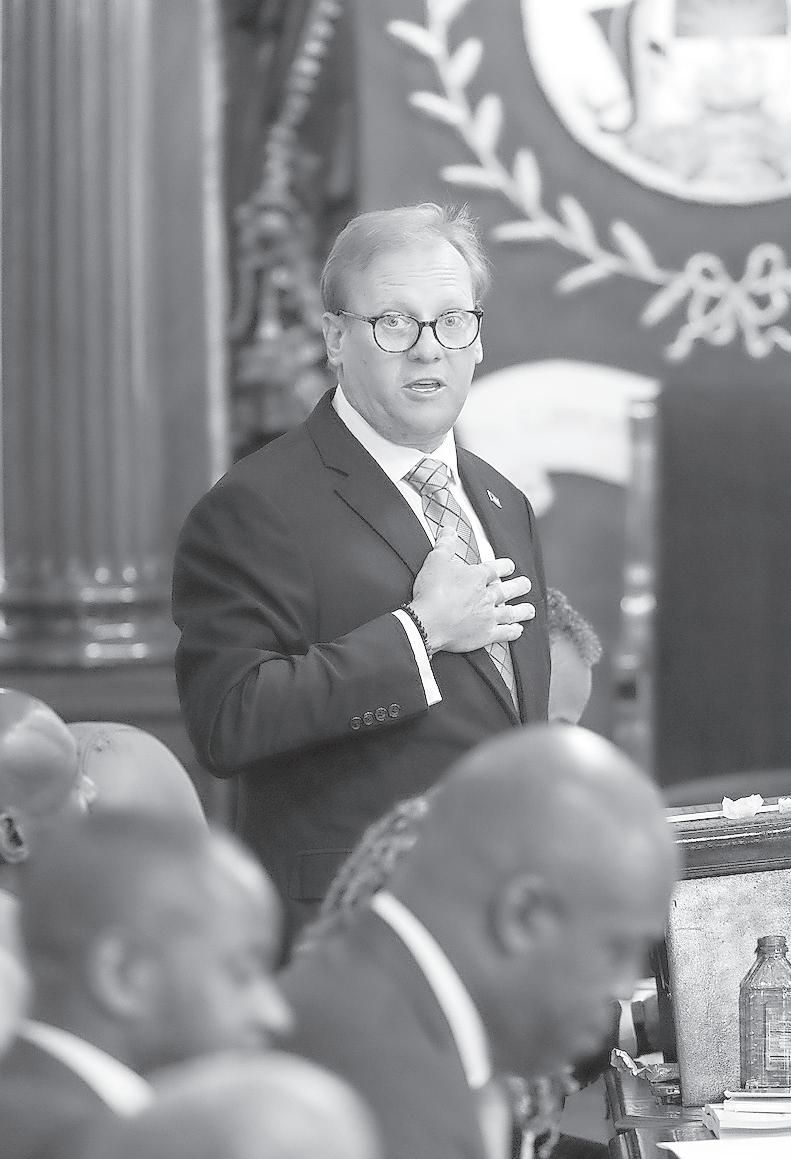

from page one
its anti-corruption efforts. The Ombudsman Office, tasked with upholding citizens’ rights and ensuring government accountability, received $39,890.
The Free National Movement criticised the government for the small budgets, suggesting the Davis administration is not supporting its legislative reforms with sufficient resources.
During his budget debate in the Senate, Mr Pinder said the allocations for
newly established institutions are effectively placeholders. He said that new hires for the Office of the Ombudsman and the Independent Commission of Investigations will not be found in the line items but will be drawn from the Ministry of Finance’s global provision line, which totals approximately $11 million.
He added that all new hires in the budget, regardless of agency, are found under this global provision line item.
“It should be noted that the facilities for each of
the institutions are already secured,” he said. “The payment for those facilities are found in the public services line item. The public service is responsible for paying for all accommodations of the government.”
Mr Pinder stressed that there are adequate provisions in the budget for both the Independent Commission and the Ombudsman Office.
“As new institutions, those allocations are found in other line items throughout different ministries,” he said.
from page one
improves public access to justice and enhances public trust. The new Supreme Court Complex will stand as a lasting symbol of justice, democracy, and national progress,” Mr Pinder said.
The complex will consist of a refurbished structure at 50 Shirley Street, which will be gutted and rebuilt internally, and a new seven-storey building to be constructed directly behind it.
Together, the buildings will house 19 modern courtrooms, eight civil, eight criminal, and three hearing rooms, along with a mediation centre, Judges’ and Registrars’ chambers, and a multi-purpose convention and theatre suite with panoramic views.
Mr Pinder said key
preparatory work by Poinciana SPV Ltd has already been completed. This includes securing financing, selecting a project manager, refining architectural and engineering plans, and acquiring key properties for the development.
The properties acquired include the Rodney Bain Building, 50 Shirley Street, 52 Shirley Street, and Gresham House.
Additional features of the complex will include a bail management centre, jury rooms, a state-ofthe-art exhibit room, and full administrative areas including a probate and civil registry centre. A multi-layered parking garage, partially underground, is also planned.
Security will be a priority, with smart access controls, CCTV, and the physical separation of
judges and inmates, supported by dedicated holding areas and meal preparation facilities for those on remand according to Mr Pinder.
The Department of Environmental Protection and Planning has approved the environmental report for the site. A certificate of environmental clearance and a demolition permit from the Ministry of Works have both been issued for the Rodney Bain Building, with a public tender for demolition expected within seven days.
A project manager has already been appointed to oversee the demolition and construction. Once demolition is completed, the government will finalise the construction tender documents and expects to award the main contract before year’s end.


from page one
work of the people,” he told reporters yesterday. “We’ve had a few meetings already. The work begins in earnest on July 2.”
He said the upcoming session, scheduled before the House of Assembly reconvenes, will include deeper discussions on potential boundary shifts.
The announcement follows pressure from Progressive Liberal Party supporters, particularly in constituencies like Golden Isles and Killarney, where significant voter imbalances have prompted demands for redistricting.
Sources told The Tribune that boundary adjustments are also being considered in areas such as West Grand Bahama and Bimini, where population growth has been driven by job expansion.
New voter registration data underscores the imbalance: Golden Isles now has 7,524 registered voters and Killarney 7,082, making them the most populated constituencies. Other high-density areas include Central Grand Bahama, Marco City, East Grand Bahama, Carmichael, Fox Hill, and Tall Pines, each with more than 6,000 voters.
In contrast, Long Island has just 1,773 registered voters; Cat Island, Rum Cay and San Salvador have 1,609; and the Mayaguana-Inagua-Crooked Island-Acklins grouping trails with only 1,340.
While the law does not require a fixed number of voters per constituency, the Constitution mandates that boundaries reflect population size and that clear practical needs justify significant disparities.
Prime Minister Philip “Brave” Davis, while in opposition, supported redrawing lines in Golden Isles and Killarney, not to create new seats, but to balance the existing ones.



NULLIUS ADDICTUS JURARE IN VERBA MAGISTRI
“Being Bound to Swear to The Dogmas of No Master”
Publisher/Editor 1903-1914
LEON E. H. DUPUCH
SIR ETIENNE DUPUCH, Kt., O.B.E., K.M., K.C.S.G., (Hon.) LL.D., D.Litt .
Publisher/Editor 1919-1972
Contributing Editor 1972-1991
RT HON EILEEN DUPUCH CARRON, C.M.G., M.S., B.A., LL.B.
Publisher/Editor 1972-
Published daily Monday to Friday
Shirley & Deveaux Streets, Nassau, Bahamas N3207
TELEPHONES
News & General Information
(242) 502-2350
Advertising Manager (242) 502-2394
Circulation Department (242) 502-2386
Nassau fax (242) 328-2398
Freeport, Grand Bahama (242)-352-6608
Freeport fax (242) 352-9348
WEBSITE, TWITTER & FACEBOOK

www.tribune242.com @tribune242

THE FNM will announce a raft of candidates today – but as they do so, there is fallout from the selection process in Abaco.
Roscoe Thompson has lost out on the nomination for Central and South Abaco. Jeremy Sweeting has secured the nomination instead.
Mr Thompson, the FNM’s branch chairman, has promptly resigned in protest.
Now this can of course be depicted by opponents as the party being in disarray – but it also highlights the process of the system.
Mr Thompson said he cannot support the candidate. The party rules say that members who publicly endorse a non-FNM candidate, or who nominate to contest elections or by-elections against a candidate chosen by the party are deemed to have resigned from the party.
If Mr Thompson, with a prominent role in the constituency party, cannot support the candidate, then frankly it is fitting that he departs.
There is of course a contrast here with former Prime Minister Dr Hubert Minnis.
Dr Minnis has been denied a renomination by the party for the next election. That is not stopping him. He has said that he will run in the next general election.
For the moment, Dr Minnis remains in the FNM. He has not said in what capacity he will run in the election –though with no nomination, he would need a massive U-turn from his leader to suddenly find himself with that option. That leaves running as an independent, or for a rival party – each of
which would see him contest an election against a candidate for the FNM, as the party is surely going to have a candidate in every constituency.
That leaves Dr Minnis in a twilight world – not out of the party yet, but with no sign of a pathway back in.
Mr Thompson has taken the matter in his own hands and headed out of the exit door – and to that extent, there is certainly a measure of honour in what he is doing. If he cannot support the candidate, for whatever reason, then he has made his feelings clear and acted accordingly. Plenty may disagree with him, but the action is clear. There are certain actions that should be taken in our system that are too often ignored. There have been instances in this administration where parliamentarians have misled the House, but have not returned to amend the record in a timely manner, or sometimes at all. That should be a shocking matter, worthy of resignation.
There have been times when our parliamentarians have not abided by the law – particularly when it comes to the law on disclosures, with this year’s outcome of those still a mystery. There have been times when there have been conflicts of interest down the years, with a failure to take the proper action to avoid any suspicion of wrongdoing.
We will see what the remaining nominations have to reveal – both in the FNM’s unveiling today and in the other parties as time ticks on. But for all the candidates who are nominated, we hope that integrity will always be the watchword.
EDITOR, The Tribune.
IT IS with a heavy heart and growing frustration that I write this letter. Our beautiful Bahamas is under siege. Every day we wake to news of another robbery, another shooting, another life cut short. The level of crime, especially violent crime, has reached crisis proportions. If we do not act decisively and immediately, we risk losing our country to these seemingly fearless criminals because they get a slap on the wrist with a good legal representation. Enough is enough. We cannot afford to treat crime with kid gloves while our communities live in fear. We need firm, strategic action, no more talk, no more committees. We need stricter sentencing, stronger policing, and a justice system that works swiftly and fairly. Criminals must come to understand that there are real consequences for their actions. Madam Commissioner of Police lead the way, send a clear message by addressing the nation to these gun tooting criminals, if caught with an illegal firearm in hand officers have been


instructed to use deadly force, if in possession of an illegal firearm, Mr Minister of legal affairs, 50 years behind bars. Let us not wait until the decision makers’ immediate families are affected. Mr Prime Minster the ball is in your court, election coming. The time for excuses has passed. The safety of our citizens and the future of The Bahamas are at stake. We must get tough on crime — or lose our country.
A VOTING CITIZEN Nassau, June 17, 2025.

EDITOR, The Tribune. I JUST came out of Central and South Florida where the cost of living is exorbitantly high for housing and rentals. I visited a family member in Fort Lauderdale and was dismayed to learn that the one-bedroom units in his apartment complex are going for $1,000 per month, while the threeand four-bedroom units are $3,000 and over. The situation in Florida, while dire, isn’t as bad as it in New Providence. That’s because the wages for semi-skilled and skilled laborers are significantly higher than the wages of their Bahamian counterparts. While the federal minimum wage is just $7.25 an hour - 75 cents more than the Bahamian hourly minimum wage of $6.50, semi-skilled Americans are either earning the same or more than Bahamian tradesmen and professionals. For example, Walmart minimum waged workers are earning $14 an hour or $560 a week. Entry level Walmart workers can earn as much as $19 an hour or $760 a week, while MacDonald’s workers earn between $11 and $17 an hour. Walmart workers who are tasked with stocking shelves and MacDonald’s workers who are flipping hamburgers are earning the same or more than Bahamian tradesmen, who would be making over $30 an hour in the US for their skills. A Walmart manager can earn as much as $600,000 per annum - which is well over $450,000 more than the Bahamian PM salary. My point in discussing American salaries is to show that while rent and mortgage payments are high in the US, at least their salary scales are designed to cushion the blow. Unfortunately for The Bahamas, especially
New Providence, the same is not the case.
We have a looming crisis in the housing market in which we are witnessing the creation of a demographic of homeless Bahamian families. I know of no legitimate homeless shelters in Nassau or Freeport. In The Bahamas, when you fall through the cracks, you land hard. Social Services is a joke. I understand that the Progressive Liberal Party government has talked about putting in place a price control in the rental industry. This will undoubtedly get a pushback from landlords who will complain about the escalating costs of maintenance, insurance and mortgage payments. The government can always force the Central Bank to lower the interest rates on mortgages, I think. Whatever the case may be, one-bedroom units in Nassau in decent areas are now out of reach for single mothers who are earning minimum wage. In many cases, these units are going for upwards of $700 to $1,300 monthly. And we’re not even factoring in the first and last security that is often required by landlords. So, a single mother would typically face the challenge of coming up with $2,000 to just get the apartment, not counting the fees to get her utilities on. If a minimum waged worker earns $240 after NIB deductions, he would be taking home $960 per month. In a scenario in which his rent is $1,000 per month, he would be $40 short. If, however, it is $700, he would have just $240 left to pay his utilities; buy
food, gas and deal with other miscellaneous issues which we all encounter, such as car maintenance, an unexpected medical bill, school lunch money, books, etc. In a word, rent for many single mothers in Nassau is fast becoming out of reach. It is no longer affordable. I am not going to judge these women. How they landed in the dire situation they find themselves in with three and four children is none of my business. In some instances, the single mother is a victim of circumstances beyond her control, such as a divorce due to physical and mental abuse; infidelity, etc.
To bring this issue up regarding the decisions they have made exposes a lack of human empathy in The Bahamas. And besides, The Bahamas, despite the sheer number of churches with apostles and prophets, is very immoral. My issue with The Bahamas is that we want to mimic the US with exorbitant pricing in mortgage and rental fees, yet our pay scales are poles apart. Election time is fast approaching. Bahamians need to demand that the PLP and Free National Movement place the matter of affordable housing as a key plank in their respective campaigns. Handing out free T-shirts, liquor, chickenin-bag with a couple hundred dollars tucked away inside while promising the campaign generals government jobs will no longer cut the mustard. This is a matter that needs to be addressed ASAP. We cannot have a situation where hardworking Bahamians cannot afford a one-bedroom apartment.
Grand Bahama June 25, 2025.
reluctance to proceed.
Mr Pinder described plea agreements as one of the most effective tools in the department’s arsenal, noting they not only reduce pressure on the courts but also spare victims the emotional toll of a trial. The 66 concluded during the year mark a continuation of the department’s long-standing strategy to expedite justice through negotiated resolutions.
While not reaching the department’s 2017 peak of 96 plea agreements, the current figures remain consistent with a broader
prosecutorial trend seen over the past decade. In prior years, the ODPP recorded 41 plea deals in 2016, 72 in 2018, 62 in 2019, 13 in 2020, and 44 in 2023. In the same timeframe, the ODPP prepared 277 voluntary bills of indictment and conducted 303 Supreme Court arraignments, reflecting the growing scale of its operations. Mr Pinder also addressed reforms to bail procedures, noting a coordinated push since late 2023 to strengthen opposition to bail and appeal questionable grants. He said the ODPP has seen success in revoking bail,
enforcing forfeitures from sureties, and prosecuting breaches of bail conditions.
The department also saw strong results at the appellate level, winning 95 of 113 Court of Appeal rulings, a success rate of 84 percent.
Internally, the ODPP has expanded significantly, growing from fewer than 20 prosecutors when he assumed office to 45 today. He said this expansion has enabled greater specialisation, with prosecutors receiving training in financial crime, human trafficking, cybercrime, and the handling of forensic evidence.

By DENISE MAYCOCK Tribune Freeport Reporter
MORE than 20 volun-
teers in Grand Bahama began shelter management training this week as officials ramp up preparations for the 2025 hurricane season.
Tammy Mitchell, administrative officer in the Ministry for Grand Bahama for Disaster Management,
said the two-day course in Freeport is the first in a series planned for East and West Grand Bahama. Held at the Collab Unit in the ministry, the training is being conducted with the Departments of Local Government and Social Services. The 25 participants include representatives from Social Services, Urban Renewal, the Red Cross, and community members.
Ms Mitchell said the sessions cover shelter selection, on-site procedures, administrative protocols, and how to care for people during emergencies.
Although East End lacks official shelters, she said it is still important for residents from that area to be trained. “Even though East End is considered an evacuation zone, we still want persons who will be helping to assist and man
the shelters with persons from EGB to know how to effectively run and operate a shelter once it is operated,” she explained. She noted that buildings must meet specific standards to be designated as shelters. Annual inspections are carried out by teams from the Ministry of Works, health agencies, the police and defence forces, Environmental Health, Social Services,
and the Red Cross.
“The ultimate goal is to safeguard people,” she said. “So you want to make sure that the structure that is sound and in good condition, secure, clean, and has the necessary amenities and space to accommodate people,” she explained.
Maurice Moore Primary School remains the designated shelter for East Grand Bahama.
Ms Mitchell said the
According to NOAA, this hurricane season could bring 13 to 19 named storms, including up to five major hurricanes.
“We have 23 shelters that are designated on the island, and we will continually be looking for more shelters,” Ms Mitchell said.
By EARYEL BOWLEG Tribune Staff Reporter ebowleg@tribunemedia.net
THE Public Hospitals Authority (PHA) has partnered with Imperial Optical to provide affordable eyewear to patients within the public healthcare system, with complete glasses available starting at approximately $100.
Costs may increase depending on lens add-ons or special requirements.
As part of the initiative, a volunteer optometrist from Imperial Optical will provide care for three days at the PHA’s Eye Care Centre. Patients who are assessed and deemed in need of glasses will be guided through a streamlined process using an online portal, which also allows them to browse available frame options.
PHA managing director Dr Aubynette Rolle emphasised the significance of the partnership in improving accessibility to vision care.
“It is quite significantly reduced than if you got
it in the private sector. That was intentional, so that we be able to serve all levels, meaning from the children in school that we can have referrals. We can have referrals through the schools that will come normally through our public system,” she explained.
Dr Richard Knowles, of Imperial Optical, confirmed the partnership is intended to be longterm, with the possibility of renewal in the future. He outlined the goal of providing comprehensive service, noting that the starting price of $100 includes both lenses and frames.
“What we’re looking at is probably doing like a, what they call a package, like the glasses lens and everything in one so the starting practice for a pair of glasses will probably be around $100 for complete pair of glasses. So that’s the starting cost,” Dr Knowles said.
He described the collaboration as a personal mission as well as a professional one.


“On a personal note, this is meaningful for me. I have worked in this centre for over 20 years, and I understand the public needs,” he said.
“I have witnessed the first-hand impact that service needed to this particular service in optometry, and that’s why Imperial Optical wanted to partner to make a significant difference to the public services.”
Health and Wellness Minister Dr Michael Darville praised the initiative for its potential to alleviate strain on the system and reduce appointment backlogs.
“For the average Bahamian, particularly those who are vulnerable and unemployed who are elderly, sometimes it’s difficult to find resources to get these necessary tests done, and with the support of Dr Knowles and his team, we find that this process will be very, very rapid and cost effective,” he said.
The facility allows patients to fill their prescriptions immediately after their appointments, ensuring faster access to vision care and improving outcomes for those dependent on public healthcare services.
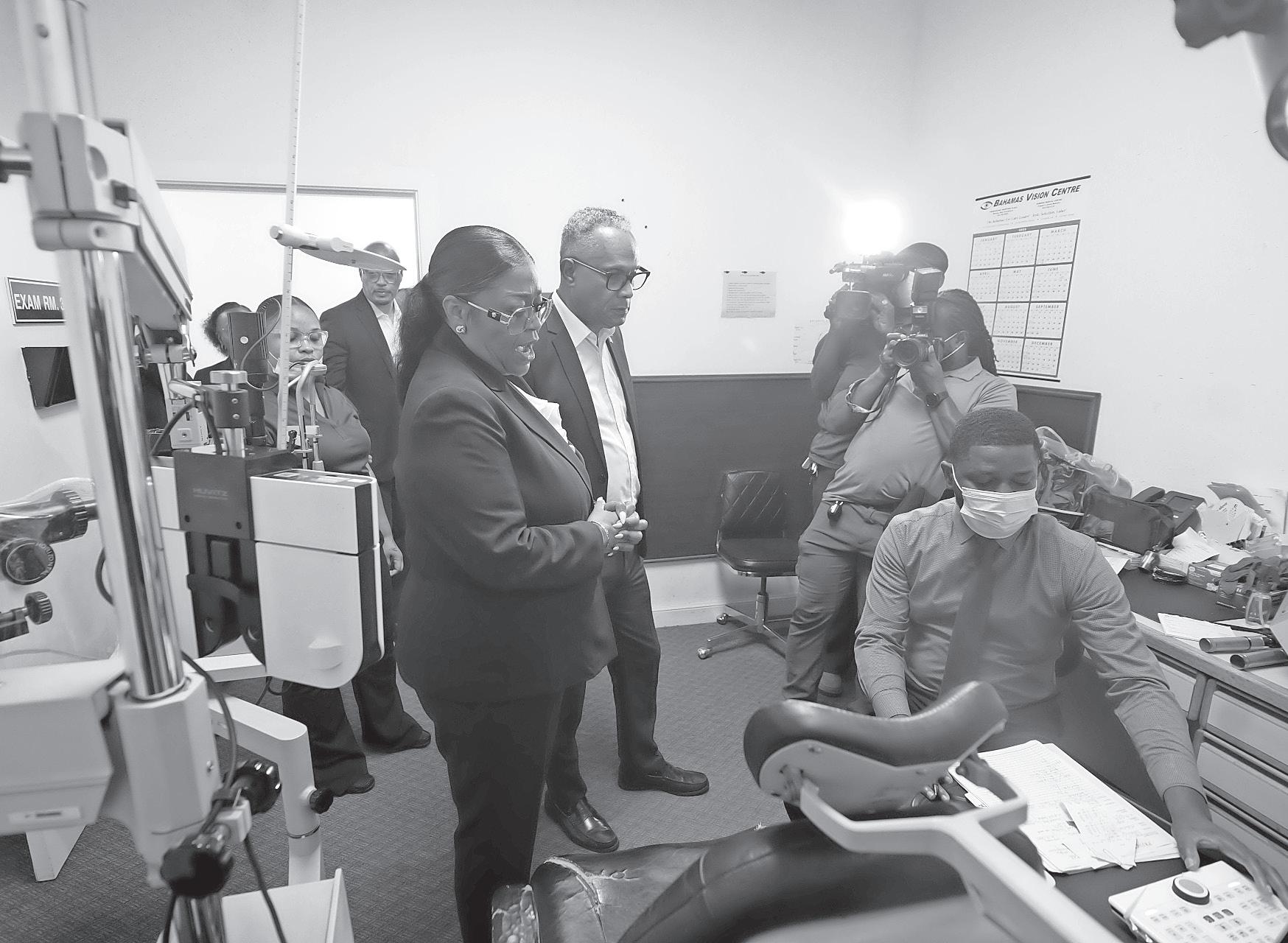



INCULCATE: “instil (an idea, attitude, or habit) by persistent instruction.”
Human development and moral education involve considerably more than “training”. It requires a broad and consistent formation of the human person by the family, schools, churches, civic programs, neighbourhoods, and other institutions.
This includes cultivating basic language skills in citizens. This is critical for personal growth and development, as well as a more flourishing civil society.
A retired teacher offers an exemplary example and story of how to inculcate and deepen humanising virtues, values, and habits through language skills such as speaking, reading, and writing.
She recalled a student who often came to school angry, disconnected, uncommunicative, uncertain, teetering on the edge. She helped to transform the teenager into a young man by equipping him with language, basic ethics, and other skills.
Over the course of a year in her English class he was able to gain a C-grade because of her devoted and dedicated attention. She always remembered she was primarily teaching a child and not just a subject. She moved him from grunting a perfunctory greeting to, “Good morning and yes Maam”, and all that such civility and respect implies. She helped him improve his language, social skills, and manners through constant assistance and prodding.
This included making

him proficient in his writing, helping him to significantly improve his speaking skills, and ensuring that he could read. His language skills helped him improve his work prospects and to feel better about himself.
Years later after they lost contact, she ran into him on his job at a delivery business which he now had for a number of years. It was then that he thanked her:
“You know, you taught me how to talk to people.” She helped him to improve his voice.
What he essentially told his former teacher was that she taught him how to relate to others, how to be more confident, how to be more humane. She helped to boost his agency, power, and self-confidence.
The acquisition of language and communication skills are essential for basic human development and flourishing. Human relations, ranging from marriages to workplaces, often

struggle and suffer because of poor communication.
Many of our people do not possess the ability to communicate effectively, and to respond without anger and violence when conflict arises. And many reason that after leaving school with a certificate that they will find a reasonably well-paying job not requiring English skills.
However, language is essential for more than the world of work. Language helps us to express our emotions, to resolve conflicts, and to communicate effectively, a difficulty for many young men. Language skills work in tandem. Reading well improves our ability to speak and to write better.
In the book Washington Black, by the black Canadian novelist Esi Edugyan,

“Reading may be one of the greatest powers in life, with the power to transform, heal, educate, agitate, inspire, infuriate and transport. Reading has the potential to be powerfully democratic.”
the title character George Washington Black or “Wash”, a slave, is taught to read, liberating his consciousness and making him one of the freest characters in the novel.
Through literary invention, storytelling and rich characters, Edugyan teases a perennial question of our existence: “What is true freedom?”
Reading may be one of the greatest powers in life, with the power to transform, heal, educate, agitate, inspire, infuriate and transport. Reading has the potential to be powerfully democratic.
The great liberationist and civil rights leader El-Hajj Malik El-Shabazz (Malcolm X) wrote and spoke of how reading and travel were among the greatest liberating forces in his life. A powerful and charismatic orator and thinker, he famously studied the dictionary in-depth while incarcerated.
Malcolm X read voraciously, hungrily, while in prison, and would likely wonder today why so many of us with access to so many books and to the internet refuse to emancipate ourselves from all manner of mental slavery, including the failure to read more and to reflect more deeply on ourselves, our communities and our environment.
No matter one’s circumstance in life, access to books and reading, especially after the invention of the internet and with access to libraries, every citizen may enjoy a treasury of nonfiction, biographies, world literature and the elixirs of poetry.
Books and reading offer us the power of words,
enfleshing our spirits and humanity. Words and language help us to struggle, to imagine, to survive, to transcend and overcome. In the words of the Native American Pulitzer Prize poet N Scott Momaday: “A word has power in and of itself. It comes from nothing into sound and meaning; it gives origin to all things.” He observes: “Anything is bearable if you can make a story out of it.”
Reading is fundamental for human happiness and development, priming us for growth and unimagined possibilities. University of Toronto researchers Maja Dijkic and Keith Oatley researched the effect of reading fiction.
The research pair found: “People who read more fiction are also better at reading other people’s emotions. It’s not that empathic people read more, but that reading promotes empathy.” In her blog on the power of books to engender empathy, Rohit Meena enthuses: “When you feel empathy toward someone, emotions rush out. Their experiences become yours because you can relate to them and these experiences can be happy or sad. In empathy, you merely don’t understand what a person is feeling, but you are experiencing those feelings.”
Reading makes us more knowledgeable. It also has the potential to make us more humane and virtuous, depending on what we read. What other ways might we help to address this deficit of civility and basic moral education?
Many educational and youth development efforts fail because they surmise that repeatedly hammering
the same message at participants will result in the formation of new habits.
Human behavior is more complex and less amenable to change than such a tunnel-vision of human psychology appreciates.
Human habits are rooted in the collaboration of biology and moral imagination. Twelve-Step programs speak to this collaboration and what it takes to arrest addictions and reform habits. Virtues and vices are essentially habits, as are language skills, which demand endless practice.
The greater use of experiential education can help young people to better attain language and other civilising skills.
US-base AMIKids employs an effective model of learning and human development that has transformed thousands of young people through a mix of academics, behavior modification, treatment and experiential learning
Many young Bahamians may profit from the experiential learning avenues employed by organisations like AMIKids including: “seamanship, water safety, fishing, low ropes, high ropes, backpacking, music, gardening, culinary arts, reptile and wilderness programmes to give each student meaningful and challenging experiences in a variety of ways”.
The highly successful programme knows from experience the power of experiential learning in education in general, and in reaching kids many have given up on:
“Experiential activities teach students when they are most receptive. And, the experience-based education allows students to get to know teachers on a different level, fostering a more relaxed relationship, influencing them to shift their behavior and to change the way they see the world.”
It is more than within our grasp to craft models of teaching and learning that may enhance and transform public education, including improving language skills, character formation, and experiential learning.


LIKE it or not, the entire world seems to rotate these days on the axis of American president Donald Trump. It seems that no one can escape the pull of the news magnet that this American president has become over four decades.
Trump has effectively gone to war with Iran. He has also already employed surrogates to enact the long-held Republican distrust of large commitments of foreign civilian assistance through the Agency for International Development. And he has also threatened to pull back, for now at least, from major European military commitments.
Trump has also brandished his executive scimitar at all sorts of projects that have been favoured by liberals.
Both at home and abroad, Trump is acting even as he continues, incessantly, to talk. He is still bloviating as much as ever, petty as usual; bombastic, profane and mendacious, as is his habit. But he is also acting. And he is encountering pushback at every turn.
Let’s take a look at some of all this activity, starting with the Iran war.
The American constitution says Congress has the power to “declare war”. At the same time, the Constitution empowers the president as the “commander in chief” of the military. Most published expert studies seem to agree that the American founding fathers intended to separate the power to launch a war from the power to conduct a war once it has begun. The Congress has the power to initiate war, but this leaves the president able to respond to sudden exigencies without first going to Congress.
American colonial-era scholarship exists on this sensitive subject. For example, in the Federalist Papers Alexander Hamilton wrote that the American president, while commander in chief of the armed forces, would have less power than the British king since a president could not declare war “by his own authority”.
Scholars point out that the American constitution also enshrines as the “supreme law of the land” those international treaties to which the US has adhered. The United Nations Charter, a treaty that the US Senate ratified after World War II says that except in selfdefence, one country may only attack another country if the UN Security Council has authorised it. Needless to say, the UN has authorised no American attack on Iran such as the one Trump launched over the weekend. Indeed, sentiment at the United Nations is running in the other direction.
During this quarter century, US presidents have sought and obtained congressional authorization for major land wars such as the Gulf War, Afghanistan and Iraq. But at the same time, they have also increasingly asserted –and exercised – the right to carry out more limited interventions, especially airstrikes, without going to Congress.
This kind of remote-control aggression conducted from 30,000 feet has become a favourite, zerocasualty device to inflict heavy damage on opponents without incurring the public wrath that would accompany loss of American lives.
In response to some of the initial uproar at Trump’s weekend sneak bombing attack on Iran, an administration spokesman said that “given the absence of ground troops, the limited mission and time frame and the efforts to avoid escalation, as well as the anticipated nature, scope

with Charlie Harper
and duration of these airstrikes, this action did not rise to the level of a war for constitutional purposes”.
Despite the outrage and even impeachment threats by some Democrats and even a few Republicans in Congress, recent presidential practice and the lack of effective Congressional pushback probably confirms this perspective.
Some background here. In 1973, toward the end of the Vietnam War and with support for that war evaporating, Congress tried to reclaim some of its war-declaring authority by enacting the War Powers Resolution, overriding in the process a veto by President Richard Nixon.
According to the War Powers Act, a president may only introduce forces into hostilities after Congress has duly authorised the action, or if the United States has been attacked.
Senator Mark Warner of Virginia, the top Democrat on the prestigious Congressional Intelligence Committee, said Trump had acted against Iran “without consulting Congress, without a clear strategy, without regard to the consistent conclusions of the intelligence community” that Iran had made no decision to develop a nuclear bomb.
Such assertions recall for many the disastrous folly of George W Bush and his ‘neocon’ advisers who rushed the US into war against Saddam Hussein’s Iraq in 2003 on specious information that the Iraqi government was in advanced stages of developing what were gravely bur erroneously described as weapons of mass destruction.
Warner picked up on this theme in his remarks. “After Trump has taken this decision to involve the US in the Iran-Israel conflict, the US gets drawn further in and then you don’t know where it’s going to stop, and Trump is really risking a repeat of the Iraq war,” he said.
Iran is larger than Iraq, as Warner pointed out, with a population of roughly 90 million and a far more capable military than the Iraqi army of 22 years ago.
Of course, it’s possible that Trump has “obliterated” Iran’s nuclear capability before it had a chance to become fully operational. But his own intelligence analysts are not supporting that claim, and it seems safe to assume that they are correct. What comes next? Iran could slowly recover from these attacks and rebuild its facilities in even more secure settings. Its nuclear scientists could move further underground and the country could hasten to build bombs. An extensive nuclear arsenal might practically indemnify Iran against attack, in addition to adding a dramatic element of threat to its relations with neighbouring nations.
Meantime, veteran and well-respected Republican pollster Kristen Soltis Anderson told a private audience earlier this week that her recent surveys have revealed an intriguing disparity in public opinion on Iran.
“When we asked voters which of several courses of American action they favoured on Iran, only 8 percent said they favoured direct engagement,” Anderson reported. “But at the same time,
well over fifty percent of our respondents believed that Iranian development of a nuclear device would represent an ‘existential threat’ to American security.”
administration’s efforts to authorize immigration agents to enter houses of worship, speed up and broaden the scope of deportations, withhold federal funds from so-called sanctuary cities and make it harder for refugees to claim asylum in the United States.
As for other Trump initiatives that are making headlines and eliciting strong pushback, The New York Times, as America’s de facto newspaper of record, is keeping track of lawsuits filed across the country, by topic and regardless of whether states, localities, organizations or individuals are the plaintiffs. Here is a summary of their findings, with a few highlights in each category. The number in parentheses is the recorded number of lawsuits filed as of Monday.
(110) Immigration: The
While it’s hard to rationalise this disparity in opinion, Anderson said such an inconsistency is becoming almost normal in American political life. “Most people really don’t have much time to ponder such issues these days,” she noted. “And the overload of confusing, inaccurate and deliberately misleading information on social media complicates almost everything in contemporary American life.”
(31) DOGE budget cuts: Elon Musk’s initiative called the Department of Government Efficiency, which temporarily exercised extraordinary power to cut costs, cancel programs and generally to reorder the government.
(46) Personnel firings: The administration has summarily fired or put on leave thousands of federal employees.
(15) Environment: Trump revoked protections against drilling in certain areas along the Atlantic and Pacific coasts, in the eastern Gulf of Mexico and in the Arctic.
(17) Transgender protections: Challenging the administration’s moves to prohibit recognizing transgender people according to their gender identity.
(9) Access to the government: The White House has used its power over access to federal property to single out certain organizations for punishment, including law firms and the Associated Press.
(10) Tariffs: State officials contend that Trump does not have the authority to impose tariffs on foreign goods without congressional approval.
(42) Miscellaneous. Includes Trump’s deployment of National Guard troops to help quell immigration enforcementrelated protests in Los Angeles.
Altogether, the Times has recorded 349 lawsuits; 197 resulted in at least a temporary stay on executive actions.
(69) Funding freeze: The administration’s attempt to freeze as much as $3 trillion in federal funding has been stalled in several cases.
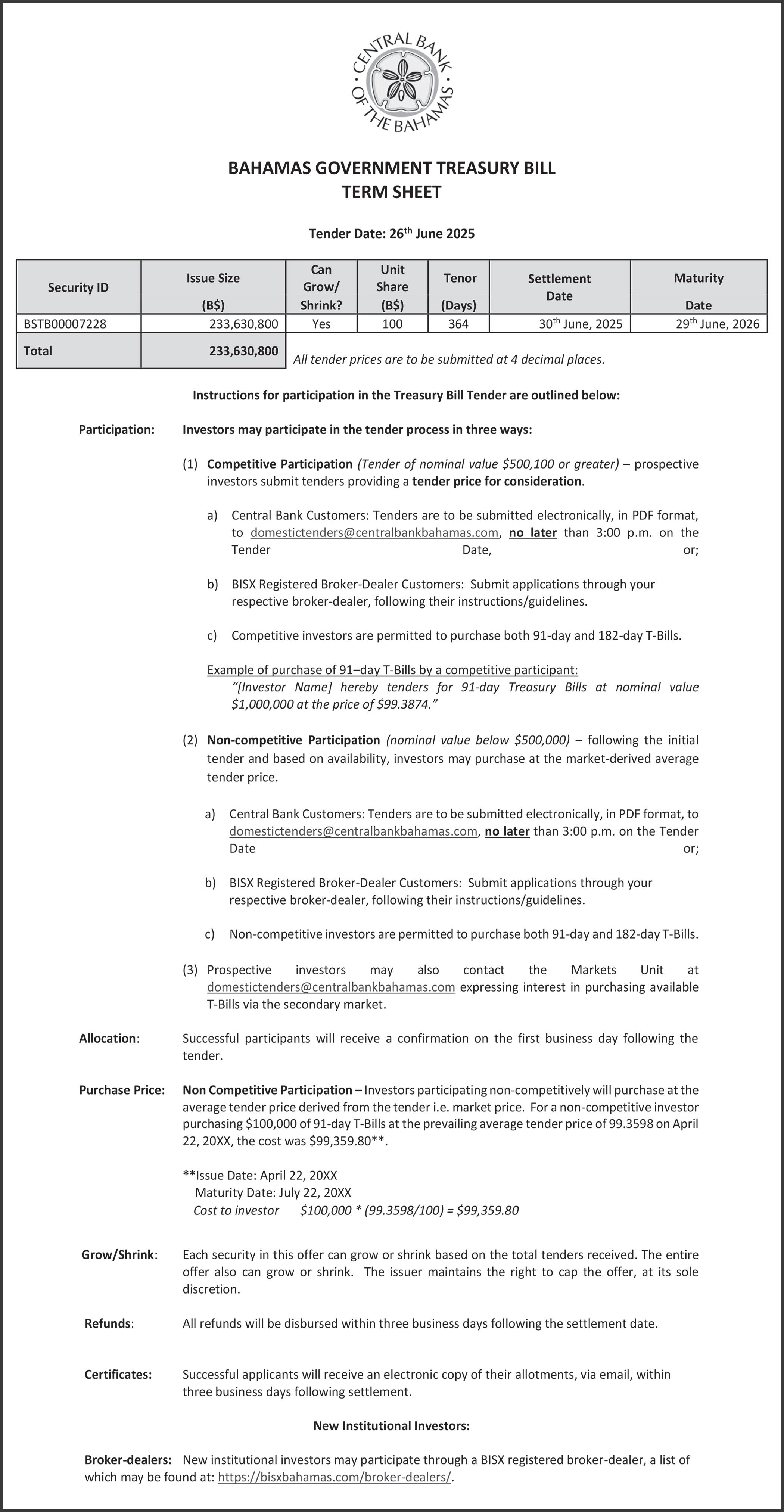
By KEILE CAMPBELL Tribune Staff Reporter kcampbell@tribunemedia.net
RESIDENTS of a Cable Beach neighbourhood say long-awaited streetlight upgrades ground to a halt late last year after a single homeowner objected to trenching near her property.
The Tribune understands Bahamas Power and Light (BPL) began replacing faulty solar lights with standard streetlights in December 2023, following years of complaints. However, work reportedly stopped at a street off Prospect Ridge, where residents claim crews were instructed not to proceed due to a resident.
Steven Carey, who has lived in Cable Beach for
44 years, said residents have been pushing for reliable lighting since the early 2000s. He said the solar lights installed two decades ago were “experimental” and barely worked outside election season. “They would come on for like two weeks and then go off. We would not see anyone from BPL until two weeks before an election,”

Mr Carey said. Mr Carey said the BPLled upgrades progressed steadily until workers reached the disputed street, at which point they were allegedly told to stop. He said a worker told him the objection of a resident caused the stoppage. In response, residents collected signatures for a petition and submitted complaints to the Office of the Prime Minister, the Cable Beach Police Station and BPL.
In an interview with The Tribune, Killarney MP Dr Hubert Minnis confirmed there had been a delay due to concerns raised by a resident. While Dr Minnis
acknowledged that trenching would be necessary to install the lights, he said, the “government would do that, and they would repair it”. Dr Minnis said the area’s infrastructure problems are part of a broader lighting initiative. “The area has had solar lighting for more than 12 years, and it was a chronic problem,” he said. “My team tried to address it ourselves. We searched different factories around the world for parts. Just one part would have cost over $20,000.”
Mr Carey said residents remain worried about safety, especially with an increasing number of Airbnbs nearby. “Tourists have stopped me and said they do not feel safe walking there at night,” he said. He said a veteran BPL worker told him he had otherwise never seen a single person prevent the government from installing streetlights in a public space. Residents said their street is still unlit while others nearby have received new lights. “We are just waiting and waiting. All the other streets are lit up. Just not ours,” Mr Carey said. BPL has confirmed it plans to move forward with the installation. The company said assessments are complete, and crews are ready to begin work.
By PAVEL BAILEY Tribune Staff Reporter pbailey@tribunemedia.net
A MAN’s appeal of his eight-year sentence for armed robbery was dismissed earlier this week after he was convicted of robbing a woman at gunpoint in front of her young child in 2021.
Marcus Ward appeared before the Court of Appeal seeking to overturn his conviction, with Justices Milton Evans, Indra Charles, and Gregory Smith presiding over the matter.
Ward’s appeal was based on five primary grounds: the trial judge allegedly failed to give a proper Turnbull direction on identification; the jury was misdirected by being asked to consider motive to lie when assessing witness credibility; the judge failed to address suggestions of corroboration for non-corroborative evidence; the verdict was
allegedly unsafe and unsatisfactory; and any other grounds the Court deemed just and reasonable.
However, the appellate justices found no merit in any of the arguments. They determined that the trial judge’s summation of the identification evidence was sufficient for the jury to properly assess the reliability of the witness. As a result, Ward’s appeal was denied, and his eight-year sentence upheld. Ward was convicted on July 14, 2022, by a ninemember jury before Justice Camille Darville-Gomez.
During the trial, Justice Darville-Gomez outlined the testimony of the victim, Marcia Hutchinson, who was robbed outside her business, VIP Clothing, on Dumping Ground Corner, around 9.30pm on February 7, 2021.
According to Hutchinson, the assailant pointed a gun at her and demanded
money. After handing over her cellphone, the man allegedly threatened, “Give me the money before I shoot you.” She then walked to her car to retrieve her handbag, which the robber searched before fleeing the scene. The robbery occurred in full view of Hutchinson’s nine-year-old child. The assailant stole a Samsung A50 cellphone and $200 in cash. Hutchinson later told the court she was terrified for her life during the ordeal.
“I feel like I was gone to die. I thought this was my last time on Earth. I was so afraid for my life. I say this how my life gone end. I thought he was going to kill me, I thought he was going to kill me,” she said during her testimony.
Damian White represented the appellant, while Shaneka Carey appeared for the Office of the Director of Public Prosecutions.
By PAVEL BAILEY Tribune Staff Reporter pbailey@tribunemedia.net
A MAN has been remanded following his arraignment for a deadly Harbour Island shooting earlier this month that left one man dead and another wounded.
Johnson Versane, 24, appeared before Chief Magistrate Roberto Reckley charged with murder, attempted murder, conspiracy to commit murder, and conspiracy to commit attempted murder.
His co-accused, Junior Norvil, 23, faced the same charges in court earlier last week.
Prosecutors allege that Versane conspired with others to commit murder and attempted murder on June 10 on Harbour Island, Eleuthera. On that day, he allegedly shot and killed Cameron Bannister, 25, while Bannister was driving a golf cart on Munnings Street. Cassius Turnquest, a passenger in the same cart, was also shot and later airlifted to New Providence for treatment.
Bannister succumbed to his injuries at a local clinic. Versane was not required to enter a plea. His case will proceed to the Supreme Court via a Voluntary Bill of Indictment (VBI), expected to be served on August 21. He was advised of his right to apply for bail through the higher court. Versane will be held at the Bahamas Department of Correctional Services until then. He is represented by attorney Bjorn Ferguson, with Inspector Deon Barr serving as the prosecutor.
By PAVEL BAILEY Tribune Staff Reporter pbailey@tribunemedia.net
A MAN was granted bail yesterday after he was accused of threatening another man with a gun and injuring him in Cat Island last week.
Rodney Rolle, 34, appeared before Magistrate Lennox Coleby on charges of possession of a firearm
By PAVEL BAILEY Tribune Staff Reporter pbailey@tribunemedia.net
A MAN was sentenced to eight months in prison on Monday after admitting to breaching his bail conditions while awaiting trial for allegedly threatening three police officers with a firearm in 2022. Jeffrey Toussaint, 22, appeared before Senior Magistrate Shaka Serville, charged with three counts of violating bail conditions. Toussaint had previously
with intent to put another in fear, threats of death, causing harm, and possession of ammunition.
Rolle allegedly threatened Stedman Holmes with a 9mm Glock pistol in Gaitor, Cat Island, on June 18. The following day, he reportedly threatened to kill Holmes and inflicted injury upon him. He was also allegedly found in possession of 9mm ammunition that same day. Rolle pleaded not guilty to all charges. His bail was set at $6,000 with one or two sureties. As part of his bail conditions, he must report to the New Bight Police Station every Monday, Wednesday, and Friday by 6pm. His trial is scheduled to begin on September 29. Assistant Superintendent of Police Lincoln McKenzie is the prosecutor.
been granted Supreme Court bail in connection with three counts of possession of a firearm with intent to endanger life. He and two accomplices allegedly endangered the lives of Cpl Pedrio Hield, PC 4187 Anton Forbes, and WPC 4200 Bradnique Adderley with a handgun on July 24, 2022, in New Providence. While out on bail, Toussaint failed to sign in at the Wulff Road Police Station for 65 days between January 1 and May 12. He also failed
to sign in at the East Street South Police Station for 29 days in connection with separate firearm and ammunition charges between January 17 and May 12. In a court appearance in late May, Toussaint reversed his earlier plea and admitted guilt, accepting the facts presented in his case. He was sentenced to serve eight months at the Bahamas Department of Correctional Services. Inspector Cordero Farrington served as the prosecutor.

By ALESHA CADET TribuneFeatures Reporter acadet@tribunemedia.net
THE walls of Abundant Life Bible Church are getting ready to echo with praise, power, and nostalgia as former and current choir members return to the stage for a long-awaited reunion concert.
Under the theme “Magnify
The Lord: Live in Concert”, the event set for Friday, July 4, promises to be a multigenerational homecoming and a celebration of spiritual legacy. The concert will begin at
7pm at the church’s sanctuary on Abundant Life Road and is expected to draw many who remember the powerful worship moments created by the Abundant Life Youth and Praise Choir over the decades.
“This highly anticipated reunion concert will unite generations of singers and musicians who once lifted their voices as part of the Abundant Life Youth and Praise Choir from the 1980s to today,” noted Travis Edgecombe of Edgy Management, the event’s publicist. Now with roots tracing
back over 40 years, the choir has seen its share of faithful leadership, including its first director, Rose Richardson, whose vision helped form what would become a cornerstone of the church’s music ministry. The upcoming concert will showcase both seasoned voices and rising talents who’ve kept the spirit alive.
Mr Edgecombe noted that among the featured performers are Kenyatta Taylor, Willissa Nyobi Mackey, Antonio J Thompson, and Eunice Rolle; artists who’ve each brought their unique style and passion to worship


music. Patrons will also be thrilled by the return of celebrated alumni A’Yanna Cartwright and Adrian Edgecombe, who are both set to take on special lead performances.
“The concert promises to be a powerful evening of musical ministry, featuring timeless church favorites and original music penned by gifted musicians within the church. It’s more than just a concert it’s a multigenerational homecoming and spiritual revival through music,” said Mr Edgecombe.
He said that, behind the
scenes, the church’s music ministry has been hard at work rehearsing for months; an emotional process that has brought moments of deep connection.
Mr Egecombe said the concert is also a fundraiser in support of the church’s Music and Media Ministry, as Abundant Life seeks to upgrade its sound equipment for more effective worship experiences.
The Abundant Life Bible church’s Minister of Music, Ryan Jones, said the members strive for excellence in everything they do, especially in ministry.
“We believe God deserves our very best, and enhancing our sound equipment will help us serve with greater clarity, quality, and impact,” said Mr Jones. Admission is $20 for adults and $10 for children 12 and under. For more information, the public is invited to contact Abundant Life Bible Church at (242) 393-8134.
“Come and witness a historic night where voices unite and hearts are lifted
‘Magnify The Lord’ is not just a concert, it’s a moment in time you won’t want to miss,” Edgecombe added.



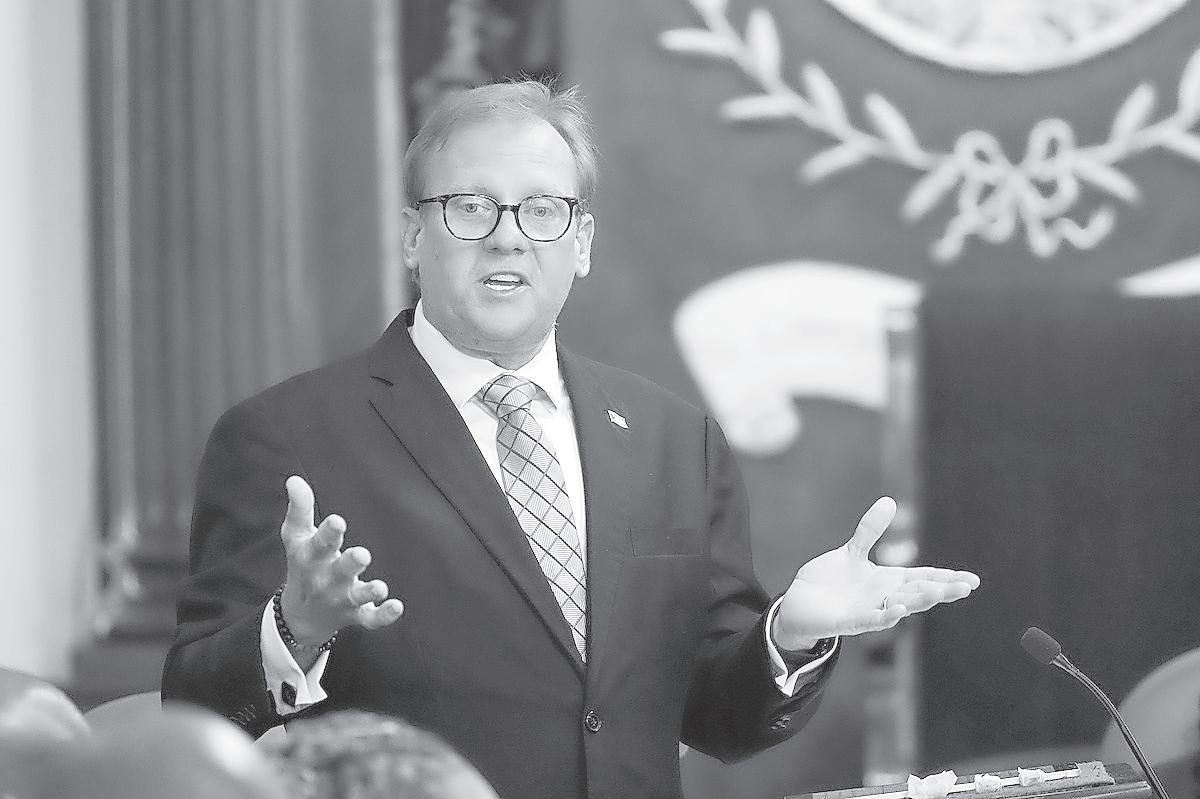
By KEILE CAMPBELL Tribune Staff Reporter kcampbell@tribunemedia.net
THE government is deploying artificial intelligence to sort and verify more than 1.4 million legacy corporate documents, a move that Attorney General Ryan Pinder said will erase decades of bureaucratic backlog and modernise the country’s entire company registry by September.
Mr Pinder outlined a digital transformation plan that targets the justice system and public registries, calling it a shift toward faster, more transparent governance. He said the AI tool is scanning historical data from the old FileNet system and automatically updating it into a new cloud-based platform, reducing manual work and human error.
He also revealed that all corporate filings must now be submitted online
starting July 14 through the revamped Company Automated Registry System (CARS), which is designed to streamline incorporations, compliance, and portfolio management. CARS’ enhanced version, CARS Business, provides service providers with tools for real-time digital filings and internal messaging. Beyond the corporate registry, the government has launched the Integrated Case Management System (ICMS), which links courts, prosecutors, and civil chambers into a single digital portal. Mr Pinder said this platform eliminates the reliance on paper files and allows legal stakeholders to track and manage cases in real time from start to finish. To expand access to civil services, the Civil Registry Operations System (CROS) has also gone live. The platform enables users to submit conveyances, affidavits, and
mortgages online, with built-in security features like QR codes and authentication tags to combat fraud.
Mr Pinder stressed that the system is designed for convenience, offering 24/7 access and removing the need for in-person visits to the Registrar of Records.
He also acknowledged that digital reform requires human investment. Long-serving registry staff who lack traditional qualifications will now have a career path under a new training and promotion structure, and a help desk is being built into the CARS system to assist during the transition.
Framing the digital shift as a matter of national importance, Mr Pinder said the upgrades are not merely technical: they’re about reinforcing trust in public systems, improving service delivery, and asserting The Bahamas’ digital sovereignty.
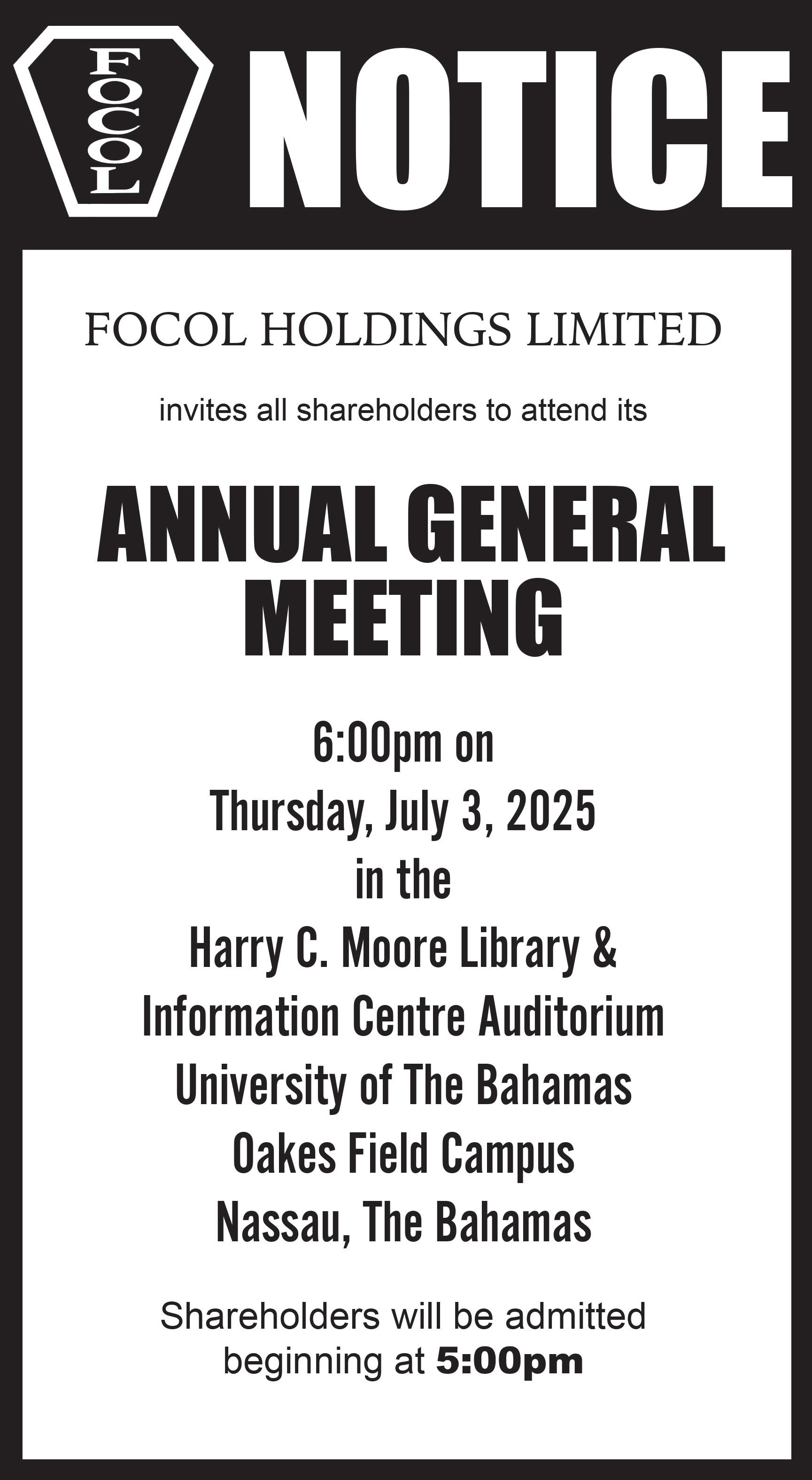

NEW YORK Associated Press
A RECORD-SMASH-
ING heat wave broiled the US East for another day Wednesday, even as thermometers were forecast to soon plunge by as many as 30 degrees in the same areas.
The day’s heat wasn’t expected to be as intense as Tuesday, when at least 50 heat records were matched or broken and 21 places hit triple-digit temperatures. About 127 million Americans remained under National Weather Service heat advisories, down from the previous day. Sizzling temperatures sent utilities scrambling to keep the air conditioning and lights on amid massive demand for power.
It’s still going to be, I think, pretty bad across the East,’’ meteorologist Bob Oravec of the Weather Prediction Center said Wednesday morning. “I think today is probably the last day of widespread record potential. It might not be quite as hot as yesterday by a few degrees. But still, high temperatures are expected in the upper 90s across a good section of the East.”
The weather service warned of “extreme heat” for a stretch of the country from North Carolina to New York and west to West Virginia. Highs could approach triple digits from New York to Richmond, Oravec said. Temperatures again broke 100 on Wednesday at New York’s John F. Kennedy Airport and in Newark and Baltimore. Temperatures Wednesday morning were “a little bit warmer than expected” because of northwesterly winds bringing “warm leftovers from yesterday,” said

former NOAA chief scientist Ryan Maue, a private meteorologist. Nantucket, Massachusetts, was above 90 degrees Fahrenheit (32 Celsius) when its forecast high was 82.
The high pressure heat dome that has baked the East was forecast to break.
A cold front began moving south from New England, bringing with it clouds and cooler temperatures — not only cooler than 100 degrees Fahrenheit (38 Celsius), but cooler than normal.
That air mass drawing on cool ocean waters will send temperatures plummeting by the end of the week in Philadelphia, which hit a record high of 101 degrees Fahrenheit on Tuesday, said
Ray Martin, meteorologist at the National Weather Service in Mount Holly, New Jersey. Air temperatures will be in the low 70s Fahrenheit (20s Celsius). It’s going to feel like a shock to the system, but it’s not anything particularly unusual,” said Martin.
Boston’s forecast high for Friday is 34 degrees lower than what it hit Tuesday. It’s going to feel like a different season,” Oravec said.
However, it won’t last. After one or two days, slightly hotter than normal temperatures are forecast, but not anywhere near the highs from earlier this week, Oravec said.
Weather whiplash from one extreme to another

occurs more often as the world warms overall from burning fossil fuels such as coal, oil and natural gas, scientists said.
Tuesday was likely the peak of the heat, with Baltimore the king of swelter. The city’s high of 105 degrees Fahrenheit (40 Celsius) smashed a previous record by four degrees. At night, when the human body needs cooling, temperatures only dropped to 87 Fahrenheit (30 Celsius).
Baltimore was hardly alone. A dozen weather stations were 101 degrees or higher, including two New York airports. Boston hit 102, breaking its old record by seven degrees. Augusta, Maine’s 100-degrees also broke
its old record by seven degrees. Every coastal state from Maine to South Carolina hit 100 degrees somewhere, with Georgia and Florida clocking in at 99 on Tuesday. As temperatures rise “things become less reliable and more unstable,” said Climate Central Chief Meteorologist Bernadette Woods Placky. The heat meant more demand for power. The nation’s largest power grid operator, PJM Interconnection, on Monday recorded its highest demand since 2011, with only a slight drop off Tuesday and Wednesday, spokesman Dan Lockwood said.
“We have an aging grid infrastructure already in United States, so you can see the impacts of that heat on that infrastructure,” said Kate Guy, senior research fellow at the Columbia University Center on Global Energy Policy. The aging system is less capable of transmitting power at the voltages needed, she said. “At the same time, you’re seeing a really big spike in demand. This is what they (utilities) are increasingly experiencing because of climate change,” Guy said. “Frankly, with each year is increased, historic temperatures and that intense heat arriving earlier than ever, just putting an immense pressure on the electrical grid.”
Extreme heat caused the road to buckle in two locations on an interstate highway in northern New Jersey. State transportation officials say the impact on the concrete roadway in Morris County on Tuesday afternoon forced some lane closures as temporary repairs were made. Crews then began work to replace the damaged areas and repave those sections. Some downtown Chicago streets will close Wednesday night to repair pavement that has buckled due to hot temperatures amid an ongoing heat wave in the city.
“Pavement failures or blowouts occur when prolonged high temperatures cause the road to expand and buckle up or blow out, resulting in uneven driving surfaces,” the Illinois Department of Transportation said in a statement.
In Chesapeake, Virginia, a heat-related malfunction prompted a bridge to remain stuck in the open position.







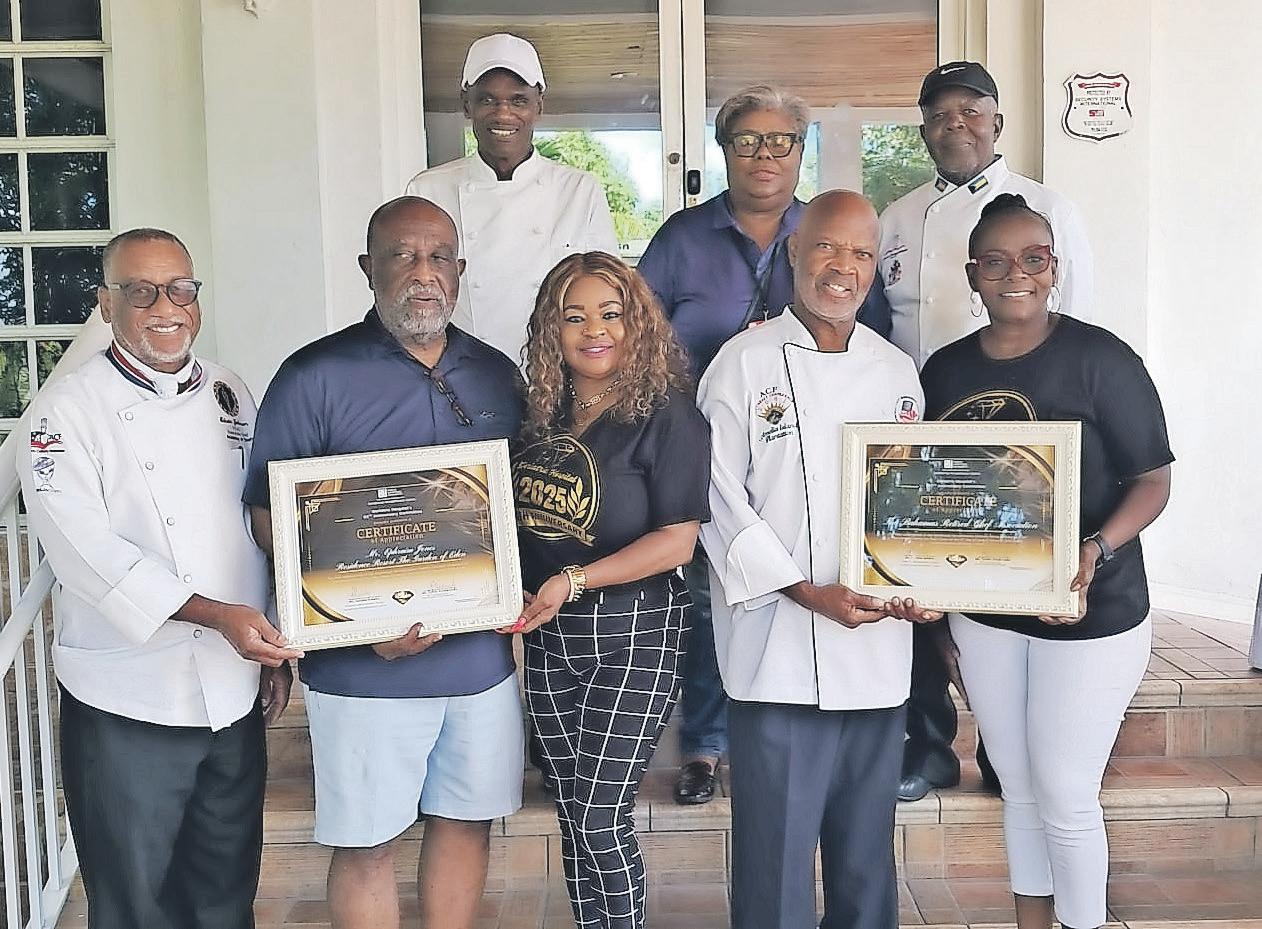
THIS month, the Geriatric Hospital celebrated its 60 years of existence under the theme: “Celebrating 60 years: Honouring our Legacy and Embracing our Future”.
Events included a Family Fun Day on June 6 during Labour Day to give families and friends the opportunity to spend quality time with loved ones at the hospital.

Residents, staff, and guests enjoyed a four-course meal provided and prepared by Ephraim Jones, proprietor of the Garden of Eden resort and members of the Bahamas Retired Chef
Association (BRCA). To demonstrate appreciation, on June 20, a courtesy call was made by Leotha Coleby, acting hospital administrator, Lolita Colebrooke, 60th anniversary
chairperson and administrative officer of the hospital and Betsy Duvalier, assistant director of communications at the Garden of Eden to present sponsors with certificates of appreciation.
THE MSC Foundation hosted two interactive sessions at the UN Ocean Conference 2025 in Nice.
The sessions featured eight speakers who highlighted the benefits to marine conservation of private and public collaborations.
Among the speakers was Dr Raveenia RobertsHanna, president of the Bahamas Agriculture and Marine Science Institute.
Highlighted was the
Super Coral Reefs Programme at Ocean Cay in The Bahamas, now home to the Marine Conservation Center.
“Our coral reefs need bold, forwardlooking initiatives that reflect the realities of a changing climate,” said Professor David Smith, chief scientific adviser to the MSC Foundation.
“The Bahamas — rich in coral heritage — holds both a deep connection to its
reefs and a unique opportunity to lead. With its remarkable natural assets, expanding educational infrastructure, and strong local expertise, the country is well placed to advance climate-resilient reef stewardship.”
Dr Roberts-Hanna added: “Our students in marine science and naturebased tourism working with the MSC Foundation at Ocean Cay this summer will be gaining knowledge and
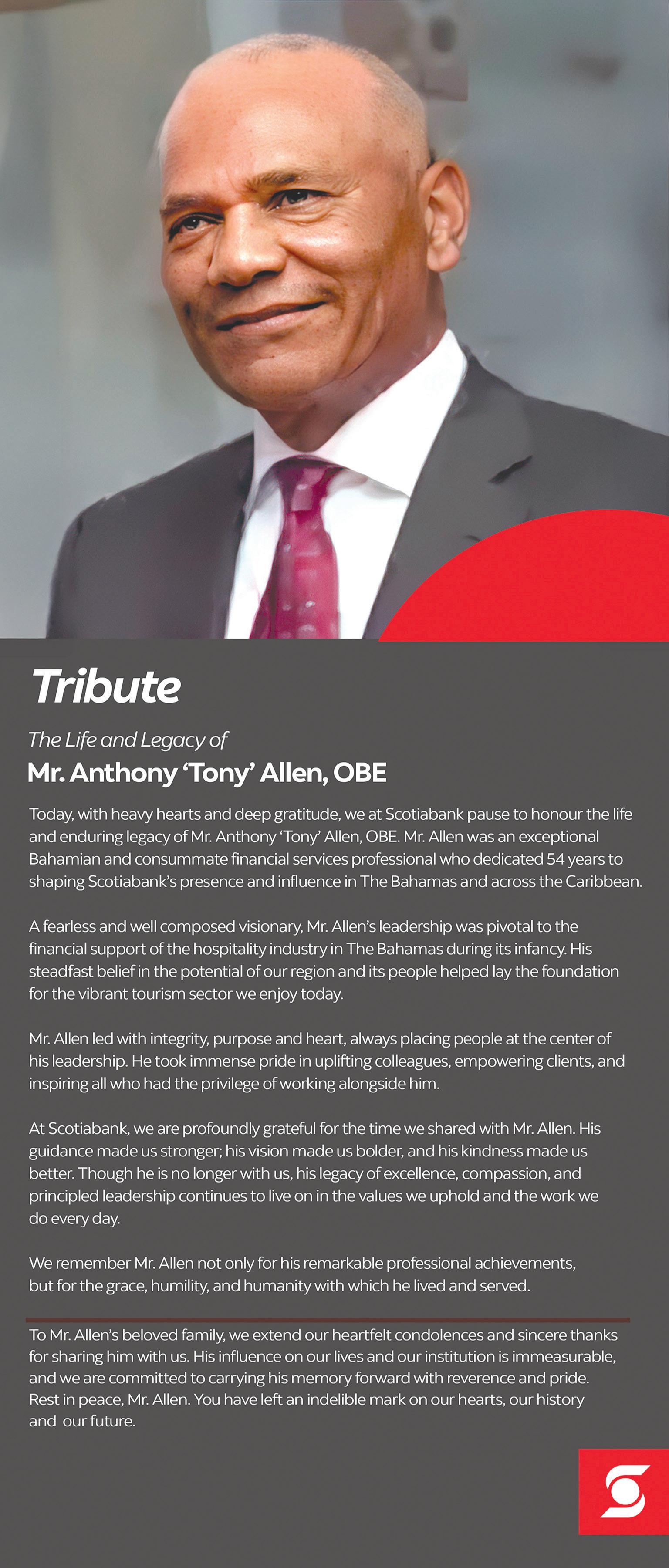
exposure to the real-world challenges and solutions shaping coral conservation. Through this partnership, we will be helping them develop new skill sets — from reef monitoring to sustainable tourism interpretation — that are essential for future careers in eco-tourism and blue economy sectors.”
Speakers included Capt Henri Lefering (MSC Cruises), Professor Ronán Long (WMU), Raffaella Giugni (Marevivo), Dr Tessa Hempson (Mission Blue) and Maeve Nightingale (IUCN).
Highlighted was a marine education programme by Marevivo engaging more than 1,000 students at more than 15 nautical institutes each year across Italy,
Spain, Greece, and Portugal, and customised training at the Sasakawa Global Ocean Institute of the World Maritime University to mid-level professionals in ocean governance, bridging policy and maritime practice.
Speakers David Smith (MARS, MSC Foundation) and Victor Galvàn (Iberostar) emphasised that when paired with tourism-linked restoration efforts, partnerships offer long-term value for sustainability, reef health, and community development.
Daniela Picco, executive director of the MSC Foundation, said: “We organised these panels to explore how private sector actors — notably those in shipping and tourism — are
contributing meaningfully to marine conservation and ocean literacy. At the MSC Foundation, we see our role not only as a funder, but as a bridge between restoration, science, education, and public engagement.
“The exchanges between these diverse partners today will help us take lessons forward to better inspire ocean stewardship across regions, communities and on board ships.”
Tom Dallison, strategic advisor, International Coral Reef Initiative (ICRI), said: “Solutions to the coral reef crisis exist, and now we need the resolve, ambition, and our combined efforts, to safeguard coral reefs, and all those that depend on them.”


TEN students from the University of The Bahamas just spent two consecutive weeks at Ocean Cay, participating in a coral study visit hosted by the MSC Foundation at its newly opened Marine Conservation Center (MCC).
During their stay, the students were involved in a workshop and reef observation, gaining exposure to coral restoration efforts, water quality assessment, species identification skills, and coral reef health assessment.
“This week has been an incredible opportunity for these students to connect theory with practice,” said Emeline Bouchet, MSC foundation marine programme manager. “The students have been introduced to coral science and coral reef restoration, as well as to fostering awareness that inspires ocean stewardship and everyday actions that support marine ecosystem health. Beyond the technical knowledge and skills, this experience is empowering them to see a future for themselves in marine conservation right here at home.”
Dr Kristen Welsh-
Unwala, executive director of the Small Island Sustainability Programme at UB, believes that a strong academic programme needs to provide practical field experience to build on rigorous theoretic training in sustainability. She said: “This opportunity for Marine Science students is critical to strengthen their understanding of the threats that corals face, in addition to opportunities that exist to address these challenges.” According to Dr Mattias Johansson, assistant professor of marine science, “Trips like this are also an amazing way for students to connect with each other, with SIS faculty, and with potential future employers like the Marine Conservation Center.”
The foundation’s work with UB is part of a broader network of coral restoration partnerships, including BAMSI, the University of Miami, and Nova Southeastern University. The foundation expects to give 30 students the chance to participate in immersive learning experiences at Ocean Cay every year.
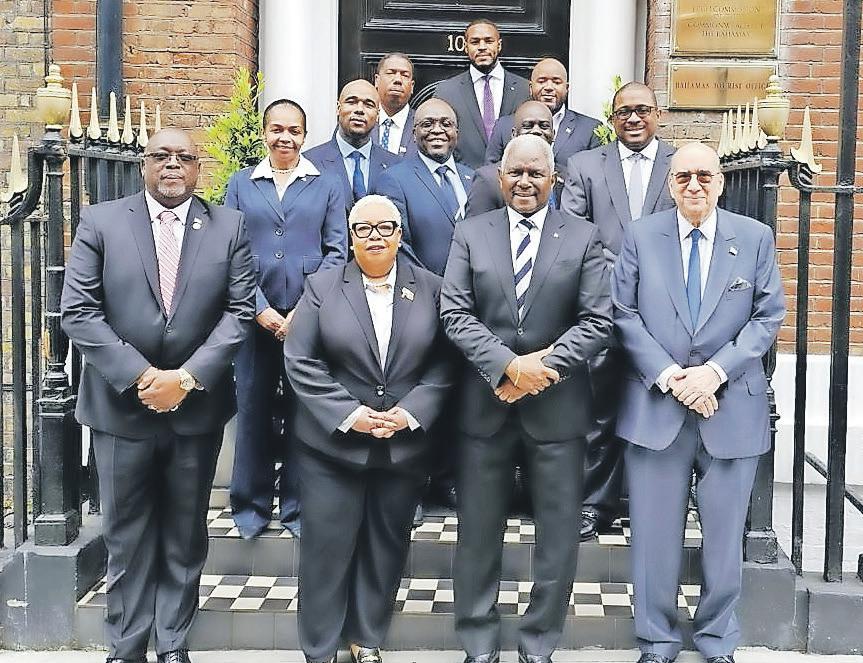
PICTURED front row, from left, Ambassador Paul Rolle; BMA chairman Jacqueline M Simmons; High Commissioner Paul Andy Gomez; Peter John Goulandris, BMA deputy chairman, second row, Julika Thompson, first secretary, Bahamas High Commission; Antonio Butler, Deputy High Commissioner; Capt Dwain E Hutchinson; Moreno Hamilton; Dario Lundy-Mortimer, back row, Rachad Adderley; Kemico Sands, Second Secretary and Vice Consul, Bahamas High Commission; LaMarque Drew.
THE Board of the Bahamas Maritime Authority (BMA), led by Chairman Jacqueline M Simmons, recently paid a courtesy call on Paul Andy Gomez, High Commissioner of The Bahamas to the United Kingdom, and Ambassador Paul Rolle, The Bahamas’ Permanent Representative to the International Maritime Organization (IMO).
The visit, held at The Bahamas High Commission in London, formed part of a series of strategic engagements during the BMA’s Management and Board Strategic Meeting. This gathering marked the first time in over five years that the authority’s global team — comprising members from Asia, Greece, London, Nassau, and New York — convened in person.
The sessions focused on charting the course for the 2025–2026 fiscal year, while also examining industry trends, regional growth opportunities, and the BMA’s expanding role in addressing global environmental priorities, such as decarbonisation and sustainability in shipping. These discussions reflect the authority’s forward-thinking approach to maintaining the Bahamas flag’s high standards and continued global relevance in a dynamic maritime sector. Also attending the courtesy call were BMA board directors: Peter John Goulandris (deputy chairman), Rachad Adderley, LaMarque Drew, Moreno Hamilton, Dario Lundy-Mortimer, and Capt Dwain E Hutchinson, BMA managing director and CEO (ex-officio). Senator Ja’Ann Major, director, was unable to attend.


